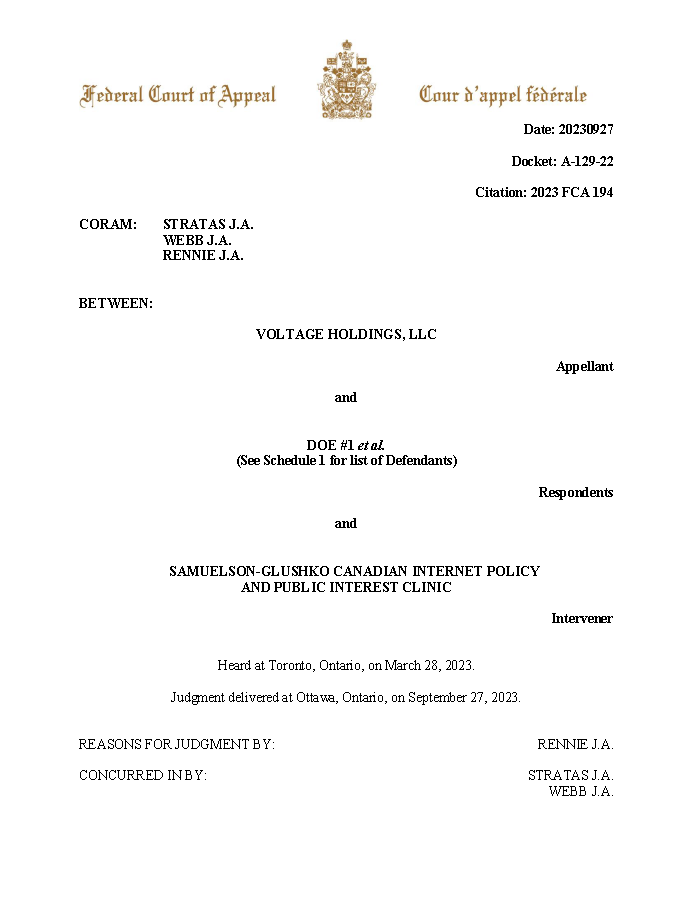Appeals Court Affirms Denial of Default Judgement in File-Sharing Case
 CIPPIC has enjoyed success in its intervention in the appeal of a denial of default judgement in a file-sharing case: Voltage Holdings LL.C. v Doe #1, 2023 FCA 194.
CIPPIC has enjoyed success in its intervention in the appeal of a denial of default judgement in a file-sharing case: Voltage Holdings LL.C. v Doe #1, 2023 FCA 194.
In 2022, Voltage Pictures sought default judgement against a number of unnamed defendants alleged to have either directly shared files of a movie or to have allowed their internet connections to be used for that purpose. CIPPIC intervened in the motion, arguing that Voltage had not made out its case and in any event was proceeding on an incorrect theory of “authorization” of infringement. Justice Furlanetto refused to grant the motion for the reasons CIPPIC argued.
Voltage appealed, arguing that Justice Furlanetto had erred in two ways:
- by refusing to infer that the internet subscriber assigned the IP address associated with the BitTorrent activity was, in fact, the person sharing the file of Voltage’s movie; and
- by refusing to find that the subscriber had authorized the sharing by not stopping the sharing once they’d received notice of the infringement.
The Federal Court of Appeal denied Voltage’s appeal on both grounds for precisely the reasons CIPPIC argued.
First, the question of whether or not to draw an inference is a discretionary decision of the trier of fact. The Appellate Court had no issue with the manner in which Justice Furlanetto had exercised that discretion.
Second, the Court of Appeal adopted CIPPIC’s characterization of the authorization right, pointing out that the jurisprudence requires evidence of a relationship of control between the authorizer and the primary infringer. Voltage’s evidence that the subscribers had received notice of the infringement and controlled their internet connection did not meet that evidentiary requirement.
The case is also significant for being the first to apply the Supreme Court’s approach to authorization of downloads articulated in SOCAN v ESA, 2022 SCC 30. CIPPIC had argued that Voltage’s argument amounts to a claim of “authorizing an authorizer”, which is not supported by the jurisprudence or a plain reading of the Copyright Act. Again, the Federal Court of Appeal saw things CIPPIC’s way, observing that authorization must be of an act identified in the Act, and that permission to use an internet connection falls outside of that description.
CIPPIC’s success in this appeal was only possible through the contributions of a team of impressive students. Kaitlyn Margison co-authored CIPPIC’s Memorandum of Fact and Law and undertook additional research. Gareth Spanglett, Melissa Liauw, Matthew Tai, Rachel Harrison, and Amy Kallio all undertook targeted research.
